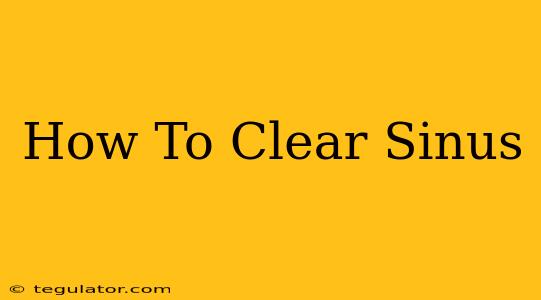A stuffy sinus is incredibly uncomfortable, making it hard to breathe, sleep, and even think clearly. Fortunately, there are many ways to clear your sinuses and find relief. This guide explores effective home remedies and when it's time to seek professional medical attention.
Understanding Sinus Congestion
Before diving into solutions, let's understand what causes sinus congestion. Sinus congestion occurs when the membranes lining your sinuses become inflamed and swollen, blocking the drainage of mucus. This can be triggered by various factors, including:
- Viral infections (like the common cold): This is the most common cause.
- Bacterial infections (sinusitis): A more serious infection requiring medical attention.
- Allergies: Exposure to allergens like pollen, dust mites, or pet dander.
- Irritants: Exposure to smoke, dust, or other pollutants.
- Nasal polyps: Noncancerous growths in the nasal passages.
- Deviated septum: A crooked nasal septum that obstructs airflow.
Effective Home Remedies to Clear Your Sinuses
Many home remedies can provide relief from sinus congestion. Here are some of the most effective:
1. Saline Nasal Rinse (Neti Pot)
A saline nasal rinse is a simple and effective way to flush out irritants and mucus from your nasal passages. A neti pot or a squeeze bottle can be used to gently irrigate your sinuses with a saltwater solution. Ensure you use distilled or sterile water to avoid infection.
2. Steam Inhalation
Inhaling steam can help loosen mucus and relieve congestion. Simply fill a bowl with hot water, drape a towel over your head, and inhale the steam for 10-15 minutes. Adding a few drops of eucalyptus or peppermint essential oil can enhance the effect. Caution: Be careful not to burn yourself with the hot water.
3. Hydration
Drinking plenty of fluids, especially water, helps thin the mucus, making it easier to drain. Aim for at least eight glasses of water per day.
4. Warm Compress
Applying a warm compress to your forehead and sinuses can help relieve pain and inflammation. Soak a clean washcloth in warm water, wring it out, and apply it to your face.
5. Elevating Your Head
Elevating your head while sleeping can help drain mucus and reduce congestion. Use extra pillows to prop yourself up.
6. Over-the-Counter Medications
Several over-the-counter medications can help relieve sinus congestion. These include:
- Decongestants: These medications help shrink swollen blood vessels in the nasal passages. Use with caution and follow the instructions carefully, as prolonged use can lead to rebound congestion.
- Pain relievers: Over-the-counter pain relievers like ibuprofen or acetaminophen can help reduce pain and fever associated with sinus infections.
When to See a Doctor
While home remedies can be effective for mild sinus congestion, it's essential to see a doctor if your symptoms worsen or persist for more than 10 days. Seek immediate medical attention if you experience:
- High fever
- Severe headache
- Facial pain or pressure
- Green or yellow mucus
- Difficulty breathing
A doctor can properly diagnose the cause of your sinus congestion and recommend appropriate treatment, which may include antibiotics for bacterial infections or other medical interventions. Don't hesitate to seek professional help when needed. Your health is paramount.
Preventing Sinus Congestion
Prevention is key! Here are some tips to help prevent sinus congestion:
- Avoid allergens and irritants: Identify and minimize your exposure to known allergens and irritants.
- Wash your hands frequently: This helps prevent the spread of infections.
- Quit smoking: Smoking irritates the nasal passages and increases your risk of sinus infections.
- Manage stress: Stress can weaken your immune system, making you more susceptible to illness.
By following these tips and seeking medical attention when necessary, you can effectively manage your sinus congestion and breathe easier. Remember, consistent self-care plays a crucial role in maintaining your overall well-being.

